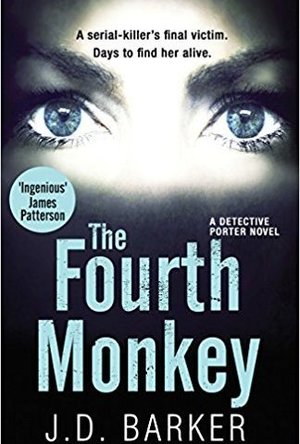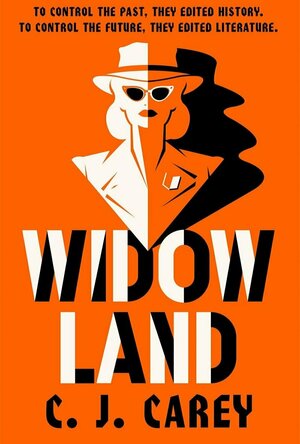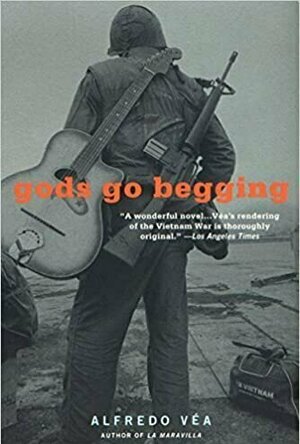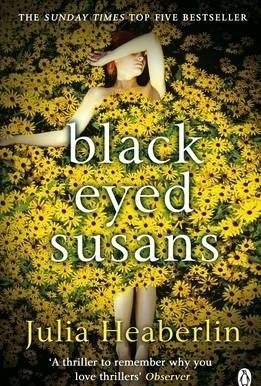
Black-Eyed Susans
Book
**THE TOP 5 SUNDAY TIMES BESTSELLER** 'My book of the year so far. Breathtakingly, heart-stoppingly...

7 Day Sugar-Free Detox
Food & Drink and Health & Fitness
App
Sugar is in everything these days, from boxed cereals to pasta sauces; it's almost impossible to...
Zuky the BookBum (15 KP) rated The Fourth Monkey (4MK Thriller, #1) in Books
Mar 15, 2018
<a href="https://bookbum.co.uk/2017/06/27/4mk/">WIN A HARDBACK COPY OF THE BOOK HERE!</a> (UK only)
------
I had so many opinions running through my head when I was reading this. At first I was excited and intrigued to find out more, then I was slightly reluctant to read it towards the middle (though I think factors outside of the book were influencing my opinion at that point) and then by the end I was super eager to finish it (in a good way) and see where it went.
This is a fast paced thriller thats going to keep you rooted to your seat. I, unfortunately, had so much to do while reading this book (work and personal life) that I wasnt able to sit and read huge chunks of it and I think thats why I got a little slow to reading it towards the middle. If youre going to read this book, my advice is to free up some of your time so you can bulk read it, otherwise some of the more shocking revelations and continuous fast paced action wont have its desired effect.
The first thing I loved about this novel is the fact that our protagonist is an older man, not some sprightly new thing coming straight out of police school. It was nice to have that less popular character as our hero. The second thing I loved was the Diary entries. I (mainly) love books that jump back and forth between past and present so when these skin crawlingly creepy diary entries started, I was pumped! They never let me down, through the entire thing they were disturbing and really added something to the novel.
My only complaint? Well, this was a buddy read with my pal Annie @ The Misstery, and we knew who 4MK was the moment we met them. Kind of a bummer but at the same time it was quite fun to see if we were actually going to be right or not (we were). It was still good fun to find out how everything came together in the end.
Overall, I really enjoyed this novel and Im already excited to see another book in the series will be out next year. The ending lines of the novel are chilling and I cant wait for them to be followed up!
<i>Thanks to HQ for sending me a copy of the book in exchange for an honest review!</i>
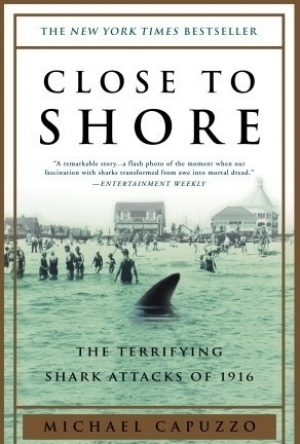
Close to Shore: The Terrifying Shark Attacks of 1916
Book
Combining rich historical detail and a harrowing, pulse-pounding narrative, Close to Shore...
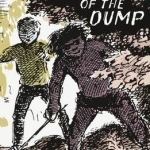
Stig of the Dump
Clive King and Edward Ardizzone
Book
A Puffin Book - stories that last a lifetime. Puffin Modern Classics are relaunched under a new...
Even though there’s a huge shortage of young men (they’ve been ‘shipped off’ to the rest of occupied Europe to ‘work’) and women greatly outnumber men, women are divided into categories, or castes. These depend on their age, heritage, reproductive status and physical characteristics, and each category is named after a significant woman in Hitlers life. Rose is a Geli, one of the elite. Young, beautiful, and most importantly, fertile.
I thoroughly enjoyed this and read it far too quickly. It had a black and white, 1950’s movie atmosphere about it, and I could easily picture the people and scenes in my head. It brought to mind The Man in the High Castle with regards to Occupation, and 1984 with regards to feeling as though you’re constantly watched - as well as the people being told how to react, think and live. This was especially evident in Rose’s job: she rewrites classics so that they’re in line with the regimes ideals: so no independent, strong females, and all the male leads are changed to Sturmbannführer (at least!).
The drudgery of everyday life made me think of how I envisaged life in the GDR - as well as only allowing state sanctioned literature, there was only one radio channel in Grand Alliance Britain, with some brave people listening to illegal foreign radio stations, knowing that this could result in extreme punishment.
When Rose goes to Widowland near Oxford (there are a few throughout the country) to find the source of a potential rebellion, she’s shocked to see older women living in abject poverty, only permitted to eat a subsistence diet and work menial jobs. But these women are intelligent, and they’re not happy in their state regulated lives. Between her reading of classic books and meeting these women, Rose begins to see what’s wrong with the world she has been living in, and this dawning realisation is so well described. We see how reading ‘subversive’ classics seems to get under her skin, and how she realises that the treatment of women is wrong in this Grand Alliance.
I could go on and on. I raced through this book, and I loved the ending, which came far too quickly!
Many thanks to Quercus for my copy of this book through NetGalley.
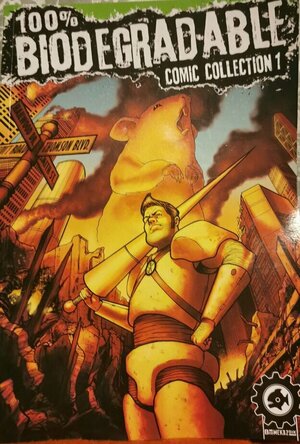
100% Biodegradable Comic Collection 1
Book
The kind of wonderful craziness we've come to demand of the creators involved" - John Freeman, Titan...
Comic
Hazel (1853 KP) rated Small Great Things in Books
May 24, 2017
The gist of the storyline is that a baby dies whilst under the care of a nurse, prompting the grieving parents to take her to court with the accusation of murder. Although that sounds like an interesting story, it barely begins to describe what the book is about. The character on trial, Ruth, is an African American labour and delivery nurse – something that in this day and age need not by an issue. On the other hand, the parents of the baby are White Supremacists: seriously racist with the belief that white people are the master race. The father, Turk, refuses to let his wife and child be treated by Ruth, however circumstances result in her being the only nurse available to watch Davis, when, unfortunately, he so happens to go into cardiac arrest. Although the reader knows that Ruth is not at fault, Turk insists she murdered his child – but is he accusing her of medical negligence, or punishing her for being black?
Three characters, all with different views and experience when it comes to racism, alternately narrate Small Great Things. Ruth and Turk represent the extremes at either side of the scale. Ruth experiences first hand the negative impact of prejudice in the American system and society, not only through this court case, but in everyday life as well. She also reveals the difficulties growing up in a predominately white environment, never feeling like she fitted in with her peers. Alternatively, Turk spent his teenage years attending KKK rallies, participating in a white power movement, and beating up anyone who was different: black, foreign, gay, Jewish and so forth.
The third character represents the majority of white people living in America. Kennedy is a public defender and the lawyer assigned to Ruth’s case. Like most of the population, she believes that she is not racist, and persuades Ruth to leave the colour of her skin out of the argument. However, as she gets to know her client, she begins to realize that it is nigh on impossible to ignore racial prejudice.
Picoult shocks the reader on two accounts: one, the way that people of colour have been, and still are, treated; and two, the revelation that an invisible empire of White Supremacists are living amongst us. Yet there is a third way in which Picoult provokes outrage – she indirectly accuses the reader of being racist, too.
There is always something to learn in a Jodi Picoult novel, for instance medical terminology, or the way in which a court trial is conducted. Small Great Things provides a lot more eye opening information than any of her previous books, unveiling facts about such a controversial subject.
Through Kennedy, the reader’s eyes are opened to the racial discrimination that we all turn a blind eye to. Ignored are the difficulties African Americans suffer when going shopping, applying for jobs, attending school, walking down the street, sitting on a bus, and so forth. Picoult asks me as a reader to think about how my life has been affected by racial discrimination: being served politely in shops because I am white, not having my ethnicity questioned when applying for college etc. Living in Britain I have not experienced openly hateful comments or behaviours towards people with a different skin tone – I used to believe this was primarily an American problem. Yet, Small Great Things has really made me think about the hierarchy of power within society, particularly in regards to the ethnicity of those at the top, compared with those at the bottom.
Jodi Picoult sat on the idea of writing a book about racism for well over a decade, yet it is particularly apt that it is published now, with the current predicaments America is facing. Although we have come a long way in attempts to achieve equality for all – compare the trial in To Kill A Mockingbird to Picoult’s version – recent events have revealed that we are no where near.
Small Great Things will shock everyone who reads it regardless of their ethnicity and so forth. Many may find it uncomfortable to read, become upset or outraged, and even feel like they are being directly targeted. If this is the case, then good – it should do that. Everyone needs to read this book. On the one hand it is a brilliant, well told story with a beautiful, almost poetic narrative, and on the other, it causes us to face up to the issues we are forever making light of or overlooking entirely. We have grown up believing that racism is a form of hatred when, actually, it is about power. However Small Great Things makes you feel, it is definitely worth reading, especially for the satisfying ending – one that you do not see coming.
Hazel (1853 KP) rated Small Great Things in Books
Dec 7, 2018
The gist of the storyline is that a baby dies whilst under the care of a nurse, prompting the grieving parents to take her to court with the accusation of murder. Although that sounds like an interesting story, it barely begins to describe what the book is about. The character on trial, Ruth, is an African American labour and delivery nurse – something that in this day and age need not by an issue. On the other hand, the parents of the baby are White Supremacists: seriously racist with the belief that white people are the master race. The father, Turk, refuses to let his wife and child be treated by Ruth, however circumstances result in her being the only nurse available to watch Davis, when, unfortunately, he so happens to go into cardiac arrest. Although the reader knows that Ruth is not at fault, Turk insists she murdered his child – but is he accusing her of medical negligence, or punishing her for being black?
Three characters, all with different views and experience when it comes to racism, alternately narrate<i> Small Great Things</i>. Ruth and Turk represent the extremes at either side of the scale. Ruth experiences first hand the negative impact of prejudice in the American system and society, not only through this court case, but in everyday life as well. She also reveals the difficulties growing up in a predominately white environment, never feeling like she fitted in with her peers. Alternatively, Turk spent his teenage years attending KKK rallies, participating in a white power movement, and beating up anyone who was different: black, foreign, gay, Jewish and so forth.
The third character represents the majority of white people living in America. Kennedy is a public defender and the lawyer assigned to Ruth’s case. Like most of the population, she believes that she is not racist, and persuades Ruth to leave the colour of her skin out of the argument. However, as she gets to know her client, she begins to realize that it is nigh on impossible to ignore racial prejudice.
Picoult shocks the reader on two accounts: one, the way that people of colour have been, and still are, treated; and two, the revelation that an invisible empire of White Supremacists are living amongst us. Yet there is a third way in which Picoult provokes outrage – she indirectly accuses the reader of being racist, too.
There is always something to learn in a Jodi Picoult novel, for instance medical terminology, or the way in which a court trial is conducted. <i>Small Great Things</i> provides a lot more eye opening information than any of her previous books, unveiling facts about such a controversial subject.
Through Kennedy, the reader’s eyes are opened to the racial discrimination that we all turn a blind eye to. Ignored are the difficulties African Americans suffer when going shopping, applying for jobs, attending school, walking down the street, sitting on a bus, and so forth. Picoult asks me as a reader to think about how my life has been affected by racial discrimination: being served politely in shops because I am white, not having my ethnicity questioned when applying for college etc. Living in Britain I have not experienced openly hateful comments or behaviours towards people with a different skin tone – I used to believe this was primarily an American problem. Yet, <i>Small Great Things</i> has really made me think about the hierarchy of power within society, particularly in regards to the ethnicity of those at the top, compared with those at the bottom.
Jodi Picoult sat on the idea of writing a book about racism for well over a decade, yet it is particularly apt that it is published now, with the current predicaments America is facing. Although we have come a long way in attempts to achieve equality for all – compare the trial in <i>To Kill A Mockingbird</i> to Picoult’s version – recent events have revealed that we are no where near.
<i>Small Great Things</i> will shock everyone who reads it regardless of their ethnicity and so forth. Many may find it uncomfortable to read, become upset or outraged, and even feel like they are being directly targeted. If this is the case, then good – it should do that. Everyone needs to read this book. On the one hand it is a brilliant, well told story with a beautiful, almost poetic narrative, and on the other, it causes us to face up to the issues we are forever making light of or overlooking entirely. We have grown up believing that racism is a form of hatred when, actually, it is about power. However <i>Small Great Things </i>makes you feel, it is definitely worth reading, especially for the satisfying ending – one that you do not see coming.
Hadley (567 KP) rated Gods Go Begging in Books
May 8, 2021
Mai and Persephone are as close as sisters, one was born in America, and the other was born in Vietnam; the two met because their husbands had fought in the Vietnam war, but had never returned, sealing an unbreakable bond between the two women. While the two spent most of their time cooking together, they decided to open up a luncheonette, and share their love of food with the city - - - until one night, when two young men showed up to smash their dreams by murdering both of them in cold blood. Little did the defense attorney for one of the young men, Jesse Pasadoble, know that these women would not only leave a scar on him, but they would also cause memories from a hill in Vietnam to haunt him all over again.
While Pasadoble is working the two women's murder case, he's also working another heart-wrenching case involving a white supremacist who has possibly molested and raped his own niece. Pasadoble tries his best to distance himself from the case, especially because he has to defend the man in question, but sometimes he lets his temper get the best of him. Pasadoble comes face-to-face with his client in an angry stare-off. After putting up with racial statements from the client, Pasadoble puts him in his place. The client may be a big man who can frighten most people, but Pasadoble pacifies him with his own anger, threatening to kick his ass in front of everyone that is in the jail setting the tone of what type of person Pasadoble can be for the reader.
The readers get flashbacks of Pasadoble's time in the Vietnam war, specifically one fight that happened on a hill near the Loatian border. These flashbacks happen suddenly throughout the book, but I personally believe that they are so important to understanding the world in which Vea has created in the novel because, near the end of the book, these flashbacks make everything come full circle. One of these flashbacks introduces an important character who is the Padre in Pasadoble's platoon - - - during such flashback, the Padre has devastating things happen around him that begin to make him question his faith in God.
Although the flashbacks happen here and there, the story easily continues on with Pasadoble's double homicide case getting more complicated by the page when the second of the two suspects is suddenly found dead on a hill that the locals call 'Tourette's Hill.' One such local that lived near the hill is one of the victims' mothers, Mrs. Harp, who is a very odd character: she's an aging beauty queen whose home is covered in photographs of only her, and none of her deceased son, and even while Pasadoble questions her about her son, she seems to get lost in a reverie of what her life was like before the son existed.
Pasadoble is the key character in this story; without him, connections would not have been made and characters would not have mattered. Pasadoble, a man who has a way with words, such as speaking with an ex-girlfriend about a 'hill' : "Carolina, think about the stratifications of an open hillside, a place where earth has given way and time itself is left exposed, layer upon layer - - - silica, clay, diatoms, and ash. Down here at this level is the time of the swelling sea; here, the time of the desert when hot, rising air would have haunted our eyes; here is a jagged karst, a time when the world shook an abrasion into its own skin; and here are the fossil dead, here you will find love and war in the same shamble of strewn bone. Here and there, where the world has shifted and cracked open, one era will touch another. And once upon the rarest time, human hands and eyes from the distant past can seek out and find... search for and contact... hands and eyes of the present time... our time. " Pasadoble reveals that everyone has a 'hill' that they constantly battle, his just happens to be the one where he lost brothers on in Vietnam.
I can't go much further into the story without giving away some of the great details that made up this book, but I can say I was blown away by this story. This is by far one of the best crime fiction books I have ever read; this is one of those crazy good books that you have never heard of that will change how you view things after you read it. Vea is one of the few authors that exist today that can make a story read like poetry. I highly recommend this novel to people who like crime fiction.
